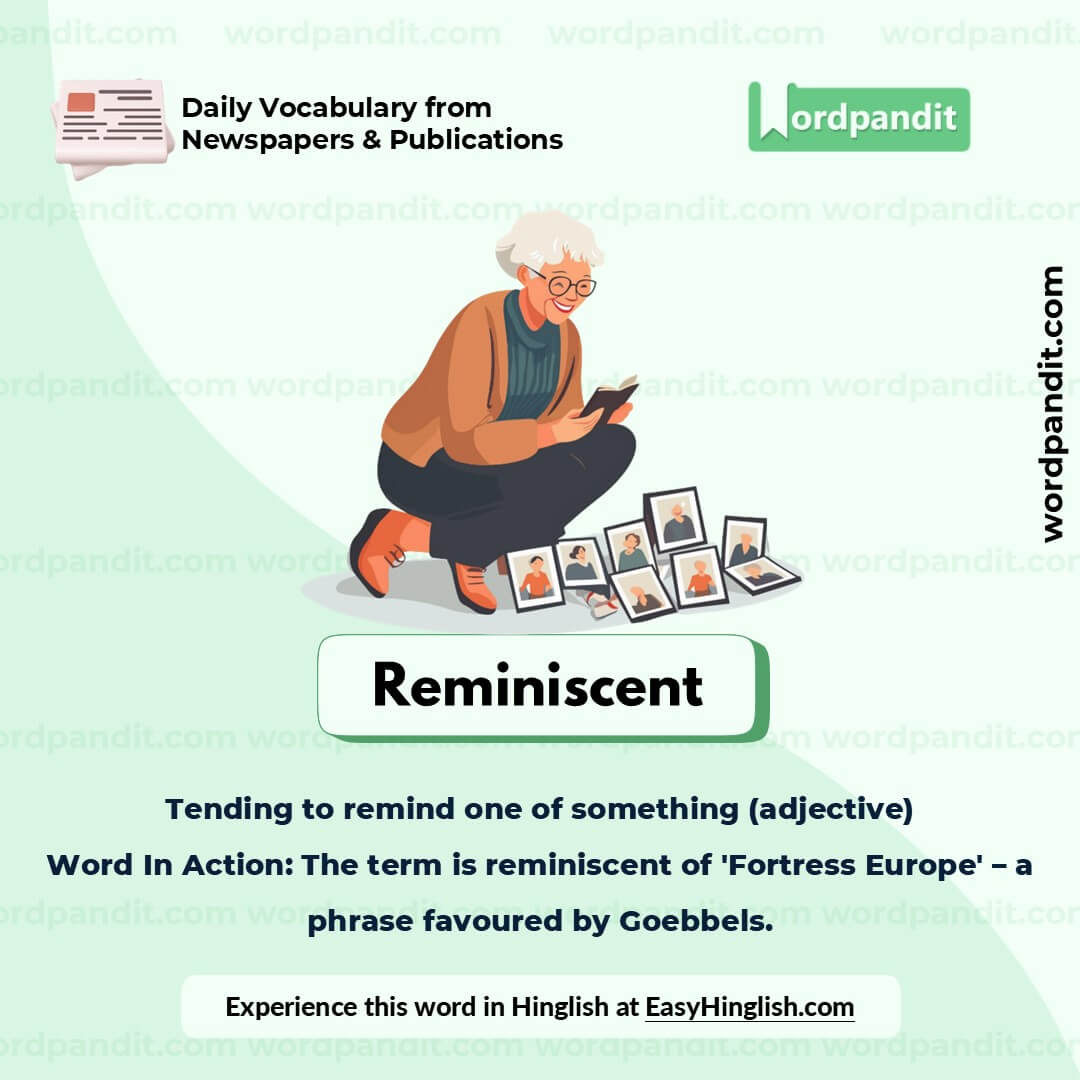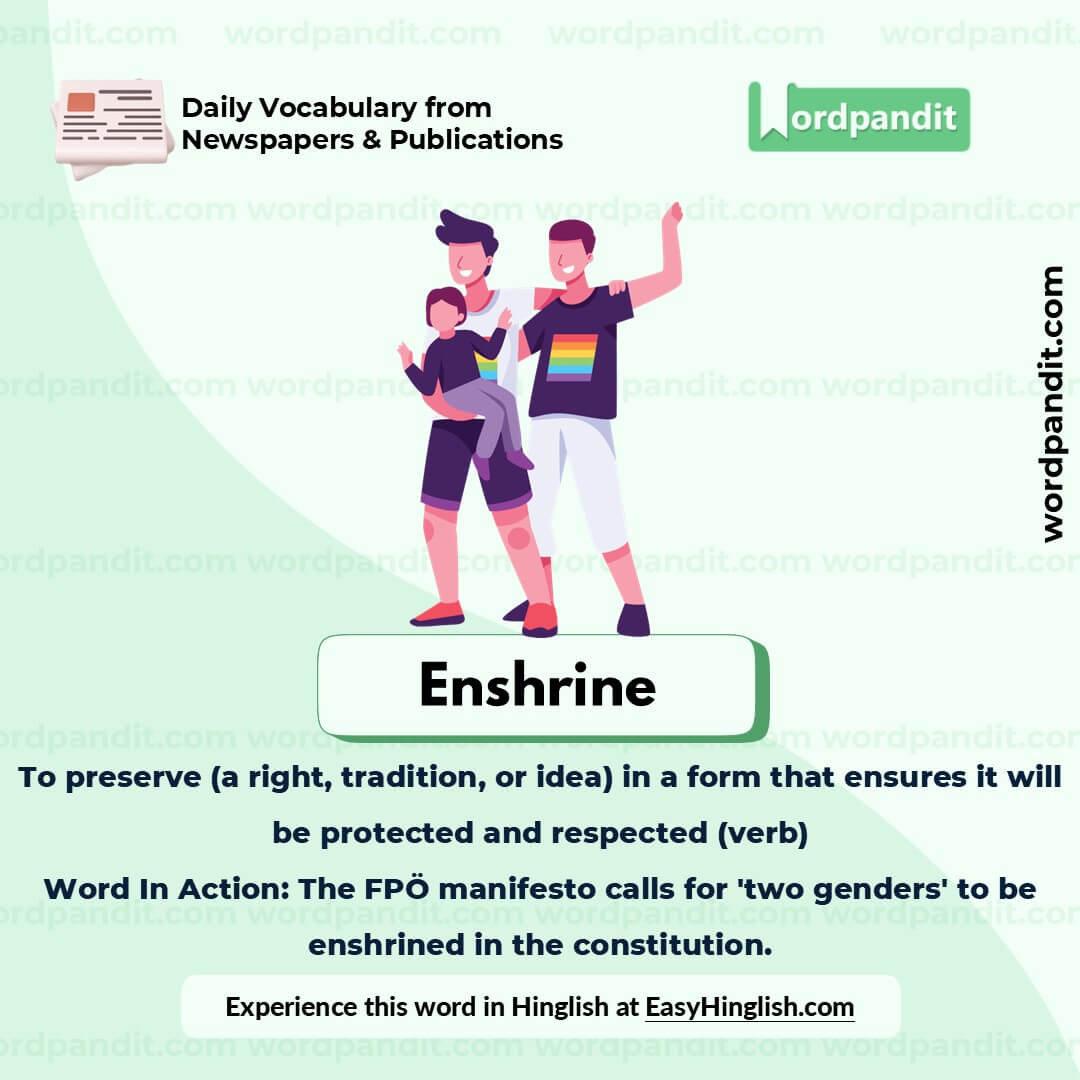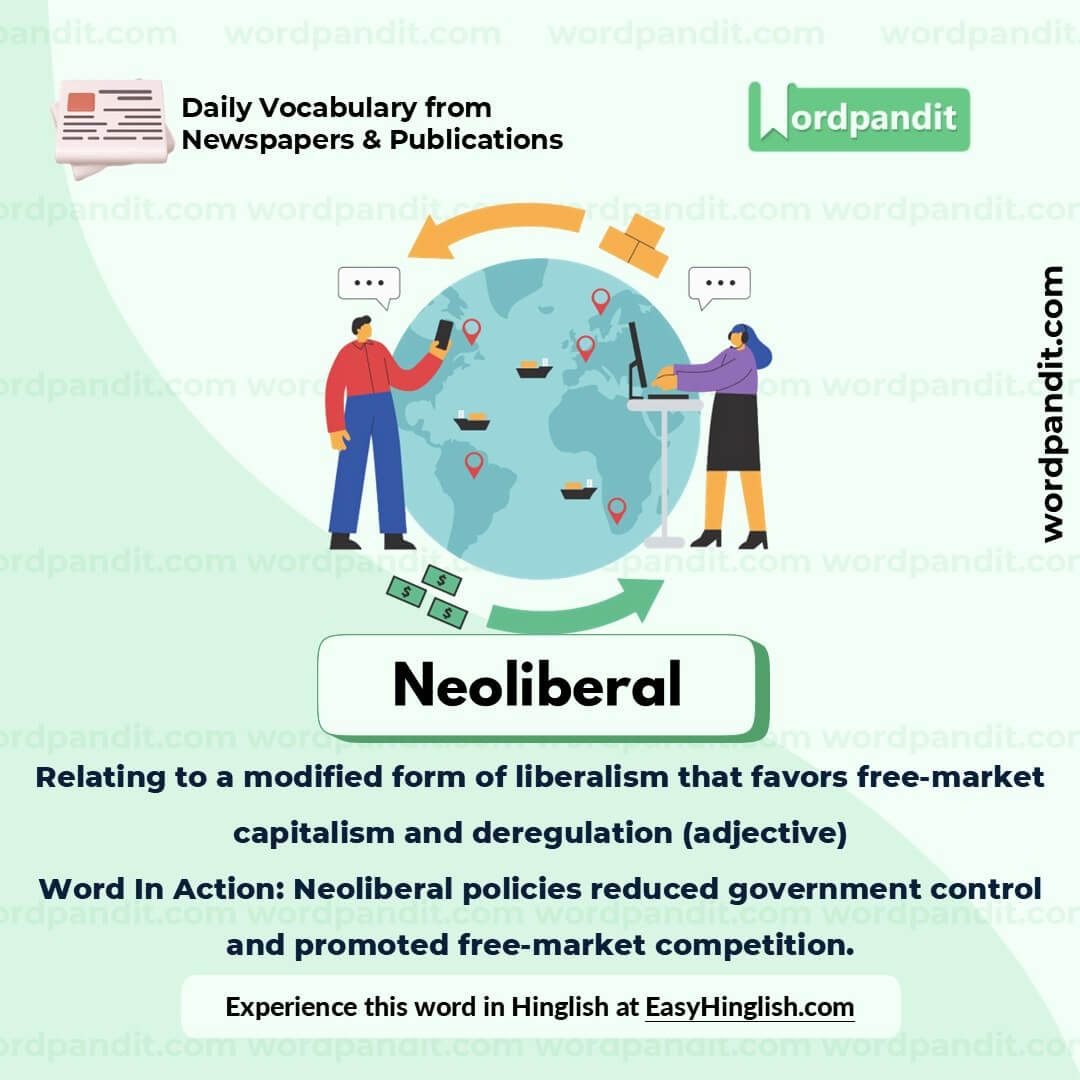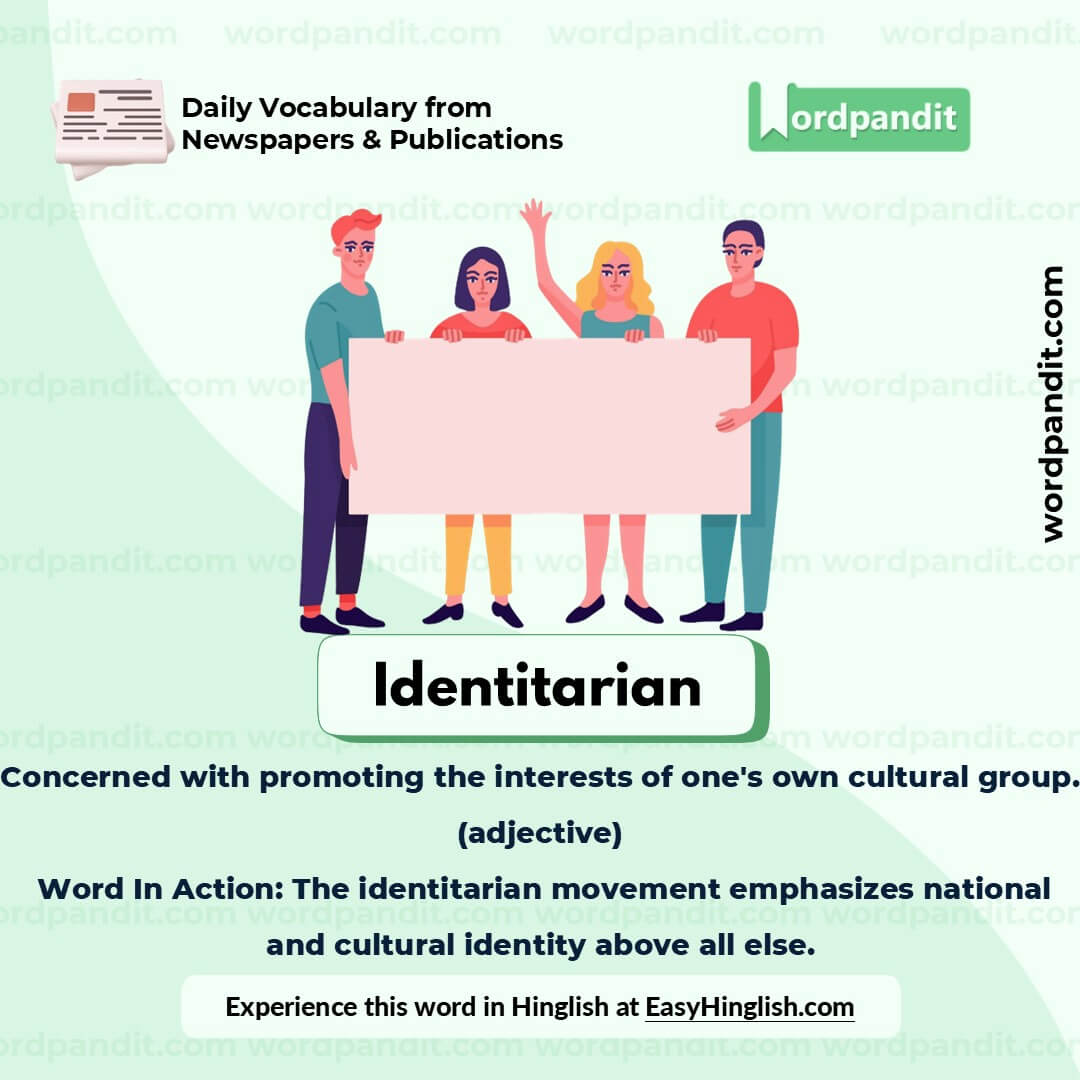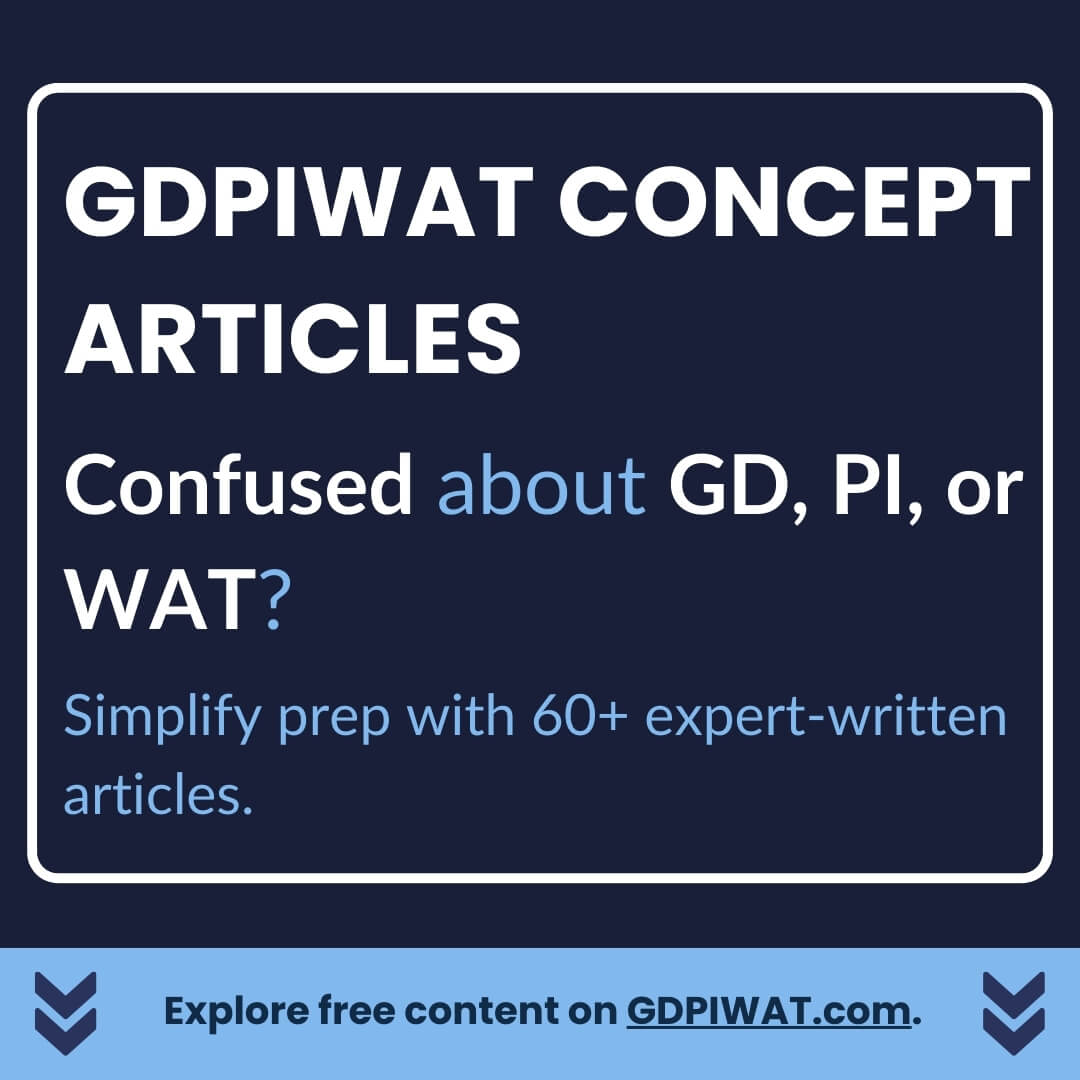Daily Vocabulary from International Newspapers and Publications
Expand Your Vocabulary with Wordpandit’s Global Vocabulary Hub
At Wordpandit, we are committed to helping you develop a truly global vocabulary by drawing from some of the most respected international publications. This section is designed to keep you ahead of the curve by introducing you to words that define global conversations and trends.
The Power of Global Sources
To help you think and communicate on a global scale, we curate vocabulary from renowned international sources, such as:
- The New York Times
- The Washington Post
- BBC
- The Guardian
- The Economist
- Scientific American
- Psychology Today
- And many more...
Stay Global, Stay Competitive
Our daily updates from international publications ensure you are consistently exposed to new words that reflect global news and developments, making sure your vocabulary is not only current but also globally relevant.
Enhance Your Global Perspective
Whether you’re preparing for international exams, aiming to excel in global business communication, or want to enhance your language skills for personal growth, Wordpandit offers the resources you need to thrive in a global context.
Effective Learning, Global Reach
Our learning methodology combines global examples, memory aids, and interactive activities, allowing you to internalize new words effectively and apply them in real-world scenarios.
Begin Your Global Vocabulary Journey Now!
Why Choose Wordpandit?
Practical Learning: Focus on words you'll actually encounter in real-world reading, enhancing your comprehension and communication skills.
Diverse Content: From current affairs to scientific breakthroughs, our varied sources expose you to vocabulary across multiple domains.
Effortless Integration: Make Wordpandit a part of your daily routine. Just a few minutes each day can significantly boost your lexicon over time.
Your Path to Vocabulary Mastery
- Visit our Daily Vocabulary section regularly
- Explore new words and their usage in context
- Practice incorporating these words into your own writing and speech
- Track your progress as your vocabulary expands
Start Your Journey Today
Embark on your vocabulary enhancement journey with Wordpandit. By consistently engaging with our daily posts, you'll build a robust vocabulary that serves you well in academic, professional, and personal contexts.
Remember, a word a day keeps linguistic limitations at bay. Make Wordpandit your daily companion in the quest for vocabulary excellence!
WORD-1: Reminiscent
Context:
"The term is reminiscent of 'Fortress Europe' – a phrase favoured by Goebbels." - The Guardian
Explanatory Paragraph:
The word reminiscent refers to something that evokes memories or comparisons to something else. When something reminds you of a particular event, person, or situation, it is reminiscent of it.
Meaning: Tending to remind one of something (adjective)
Pronunciation: reh-muh-NIH-suhnt
Difficulty Level: ⭐⭐ (Intermediate)
Etymology: From Latin reminisci meaning "to recall to mind"
Synonyms & Antonyms:
Synonyms: evocative, suggestive, redolent, similar
Antonyms: forgetful, oblivious, unlike
Usage Examples:
- The smell of freshly baked cookies was reminiscent of her grandmother's kitchen.
- His voice was reminiscent of an old friend from years ago.
- The movie's style is reminiscent of classic 80s action films.
- That song is so reminiscent of our summer road trips.
Cultural Reference:
The phrase "reminiscent of the past" often appears in literature and speeches, evoking nostalgia for earlier times.
Think About It:
Why do certain smells or sounds trigger memories more powerfully than visual reminders?
Quick Activity:
Write down three things that are reminiscent of your childhood and explain why they bring back those memories.
Memory Tip:
Think of "reminiscent" as related to "remember" to recall that it refers to something that brings back memories.
Real-World Application:
Use "reminiscent" to describe situations, objects, or people that bring back memories, especially in storytelling or when drawing comparisons.
WORD-2: Enshrine
Context:
"The FPÖ manifesto calls for 'two genders' to be enshrined in the constitution." - The Guardian
Explanatory Paragraph:
The word enshrine refers to the act of officially preserving or protecting something, usually a right, value, or principle, as sacred or important in law or custom.
Meaning: To preserve (a right, tradition, or idea) in a form that ensures it will be protected and respected (verb)
Pronunciation: en-SHRINE
Difficulty Level: ⭐⭐⭐ (Intermediate)
Etymology: From Old English enshrinen, meaning "to place in a shrine"
Synonyms & Antonyms:
Synonyms: immortalize, preserve, safeguard, sanctify
Antonyms: discard, overlook, abandon, neglect
Usage Examples:
- The principles of freedom of speech are enshrined in the Constitution.
- They fought to have their cultural traditions enshrined in the community's bylaws.
- Her memory was enshrined with a statue in the town square.
- The new laws enshrine the rights of all citizens to vote.
Cultural Reference:
The phrase "enshrined in law" is frequently used in political discourse to signify when rights or principles are formally protected by legal statutes.
Think About It:
What values do you think should be enshrined in law for future generations, and why?
Quick Activity:
List one principle or right you believe should be enshrined in your country's laws and explain your reasoning.
Memory Tip:
To remember "enshrine," think of something being placed in a shrine to keep it safe and sacred, just as values are preserved in laws.
Real-World Application:
Use "enshrine" to talk about formalizing protections or values in legal or cultural contexts, especially in discussions about rights or traditions.
WORD-3: Neoliberal
Context:
"In neoliberal fashion, the actual problem – namely, insufficient subsidies for the arts – was translated into a competitive conflict." - The Guardian
Explanatory Paragraph:
Neoliberal refers to an economic and political ideology that emphasizes free-market capitalism, minimal government intervention, deregulation, and privatization. It is often associated with policies that promote individualism and competition, sometimes at the expense of social welfare programs.
Meaning: Relating to a modified form of liberalism that favors free-market capitalism and deregulation (adjective)
Pronunciation: nee-oh-LIB-er-uhl
Difficulty Level: ⭐⭐⭐⭐ (Advanced)
Etymology: From neo- (new) + liberal (from the Latin liber meaning "free")
Synonyms & Antonyms:
Synonyms: capitalist, free-market, libertarian, laissez-faire
Antonyms: socialist, interventionist, collectivist, statist
Usage Examples:
- Neoliberal policies often emphasize cutting public spending in favor of privatization.
- The rise of neoliberalism has shifted many countries' economic policies towards deregulation.
- Critics argue that neoliberal reforms increase inequality and weaken social safety nets.
- Neoliberal thinkers believe in the efficiency of markets to drive innovation and growth.
Cultural Reference:
Neoliberalism gained prominence in the 1980s, under leaders like Margaret Thatcher in the UK and Ronald Reagan in the US, who advocated for reduced government intervention in the economy.
Think About It:
What are the potential benefits and downsides of neoliberal economic policies in today's society?
Quick Activity:
Research a country where neoliberal policies have been implemented and analyze their impact on the economy and society.
Memory Tip:
Remember "neoliberal" by thinking of "new liberal" economics that prioritize free markets and less government control.
Real-World Application:
Neoliberal policies are frequently discussed in debates about economic reform, social inequality, and globalization. Understanding this term helps in analyzing modern economic strategies.
WORD-4: Charismatic
Context:
"When the charismatic Jorg Haider led the FPÖ in the 1990s, he avoided Nazi rhetoric, and the party at least imitated liberal values." - The Guardian
Explanatory Paragraph:
A person who is charismatic possesses a special charm or appeal that inspires loyalty and enthusiasm. They naturally attract attention and admiration, often seen as confident leaders with a magnetic personality.
Meaning: Exhibiting a compelling charm that inspires devotion in others (adjective)
Pronunciation: kar-iz-MAT-ik
Difficulty Level: ⭐⭐⭐ (Intermediate)
Etymology: From Greek kharisma meaning "favor, gift of grace"
Synonyms & Antonyms:
Synonyms: charming, magnetic, captivating, influential
Antonyms: dull, uninspiring, repelling, forgettable
Usage Examples:
- The charismatic speaker quickly won over the crowd with his passion and charm.
- Her charismatic leadership was key to the company’s success.
- Many leaders throughout history have been known for their charismatic personalities.
- He used his charismatic presence to rally support for the cause.
Cultural Reference:
Charismatic leadership is a term used in sociology and political science to describe a leader who possesses extraordinary personal qualities that inspire followers, such as Martin Luther King Jr. or Mahatma Gandhi.
Think About It:
Do you think charisma is an essential quality for good leadership? Why or why not?
Quick Activity:
Write a short paragraph about a charismatic person you know or admire and describe what makes them stand out.
Memory Tip:
To remember "charismatic," think of someone who "casts a spell" with their charm and magnetism.
Real-World Application:
In professional or social settings, describing someone as charismatic can highlight their leadership potential or likability.
WORD-5: Identitarian
Context:
"To me this was code for a place on the death lists of identitarian thugs who flocked around the FPÖ at their election rallies." - The Guardian
Explanatory Paragraph:
The term identitarian refers to a political ideology that focuses on identity politics, often emphasizing ethnic or cultural identity over other societal concerns. The term is usually associated with far-right movements that promote the idea of preserving a homogeneous national or ethnic identity, sometimes through exclusionary or extremist practices.
Meaning: concerned with promoting the interests of one's own cultural group. (adjective)
Pronunciation: eye-den-ti-TAR-ee-an
Difficulty Level: ⭐⭐⭐⭐ (Advanced)
Etymology: From French identitaire, derived from Latin identitas meaning "the same"
Synonyms & Antonyms:
Synonyms: nationalist, ethnocentric, separatist, tribalist
Antonyms: cosmopolitan, inclusive, multiculturalist, globalist
Usage Examples:
- The identitarian movement in Europe has been criticized for its exclusionary policies.
- Identitarian leaders argue for the preservation of national culture against global influences.
- She was alarmed by the rise of identitarian groups in her country.
- Identitarian rhetoric can often be found in the speeches of far-right politicians.
Cultural Reference:
The identitarian movement gained global attention after the 2017 Charlottesville rally in the U.S., where white nationalist groups protested under identitarian slogans. - Various News Sources
Think About It:
How can focusing on identity politics both unite and divide a society?
Quick Activity:
List two positive and two negative consequences of strong identitarian beliefs in politics.
Memory Tip:
Remember "identitarian" by thinking of "identity" combined with "arian," suggesting an intense focus on identity-related issues.
Real-World Application:
The term "identitarian" is often used in discussions of political movements that prioritize ethnic and cultural identity, making it relevant in modern political analysis.



